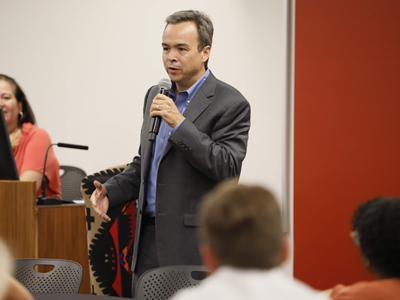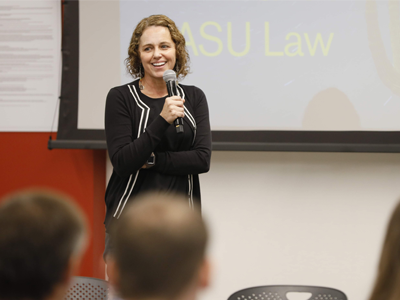ASU Law launches nation’s first Indian Gaming and Tribal Self-Governance programs

Ann Marie Bledsoe Downes and Lawrence S. Roberts join as founding faculty of ASU Law's new Indian Gaming and Tribal Self-Governance Programs.
The Sandra Day O’Connor College of Law at Arizona State University has announced that it will be the first law school in the United States to offer programs focused in both Indian Gaming and Tribal Self-Governance as part of its Indian Legal Program (ILP).
Tribal initiatives have successfully addressed challenges that echo from repudiated federal policies. ASU Law is supporting those tribal initiatives by developing advanced degree programs focused on Indian gaming and tribal self-governance for professionals who desire an advanced, concentrated curriculum in these areas.
The Indian Gaming Program is anticipated to provide an in-depth curriculum focused on the legal developments that led to Indian gaming, the Indian Gaming Regulatory Act, the role of tribal and federal regulatory agencies, tribal-state compacts, intergovernmental agreements and evolving trends in Indian gaming.
The Tribal Self-Governance Program is anticipated to include courses focused on federal Indian policy, the Indian Self-Determination and Education Assistance Act, planning for assumption of federal programs, strategic planning and administration, negotiation of contracts and compacts with the federal government, the HEARTH Act and evolving trends in tribal self-governance.
“ASU Law is committed to serving the educational needs of our tribal nations,” said ASU Law Dean and Professor of Law Douglas Sylvester. “With the addition of our Indian Gaming and Tribal Self-Governance programs, we are building upon our world-class Indian Legal Program to ensure that our students receive the best possible education and real-world experience while they are here.”
The Indian Gaming and Tribal Self-Governance programs will equip professionals with a background in federal Indian law and comprehensive courses designed to help graduates seamlessly integrate into the job of their choice.
Graduates may serve as in-house counsel, senior or mid-level executives for tribes or tribal entities, tribal elected officials responsible for overseeing these aspects of their tribal operations and other professionals with careers that intersect with these areas, such as congressional staff and federal, state and local employees.
The programs will be offered as a degree emphasis in the Master of Legal Studies (MLS) degree program and Master of Laws (LLM) degree program, as well as a certificate.
“History has also shown that tribes can better meet the needs of their citizens when the federal trustee works to promote tribal sovereignty and self-determination. We believe that both our programs will provide critical education for those working for the tribes or in Indian gaming,” said Sylvester.
Founding faculty include Professors of Practice Lawrence S. Roberts and Ann Marie Bledsoe Downes.
Roberts was appointed to a position within the Indian Affairs office in the Department of the Interior by President Barack Obama in 2012 and served in a variety of leadership positions while there. As the deputy assistant secretary for policy and economic development, Roberts supervised the Office of Self-Governance, the Office of Indian Energy and Economic Development and the Office of Indian Gaming. Roberts later served as the principal deputy assistant secretary for Indian Affairs, managing all Indian Affairs programs and offices, including the Bureau of Indian Affairs and the Bureau of Indian Education.
Roberts served as the acting assistant secretary for Indian Affairs and led Indian Affairs for the final year of the Obama administration. Over the course of the Obama administration, Indian Affairs restored over 500,000 acres of homelands to tribal nations; implemented the HEARTH Act to promote tribal sovereign authority over the leasing of tribal lands; revised regulations to advance tribal self-governance and self-determination in the areas of the Indian Child Welfare Act, land into trust, the granting of rights-of-way across Indian lands; the leasing of Indian lands; and reorganized the Bureau of Indian Education.

Professor Lawrence S. Roberts speaks at the Indian Legal Program's Welcome Dinner earlier this year.
“Professor Roberts’ depth of experience in leading Indian Affairs at the Department of the Interior during the Obama administration, serving as general counsel of the National Indian Gaming Commission, and work as a trial attorney at the United States Department of Justice will provide students with the insights and skills needed to excel in an increasingly competitive job market,” said Patty Ferguson-Bohnee, professor and faculty director for ASU Law’s Indian Legal Program and director of the Indian Legal Clinic.
Roberts, a member of the Oneida Nation of Wisconsin, grew up in an urban environment, and it wasn’t until law school that he fully appreciated how federal Indian policies directly affected his family.
“College was not a certainty, but it was a goal. It was a goal instilled by my grandmother, Maxine Elm, who earned her college degree after raising 10 children. She went on to work for a university, helping Native students earn their degrees,” said Roberts. “My journey to ASU Law was not a straight line, but a series of learnings from setbacks and preparing for opportunities. My personal journey would not have been possible without the foresight, support and assistance of Oneida leadership, encouragement from my family, and the countless professionals and mentors that have guided me every step of the way.”
“I look forward to educating the next generation of Native professionals that stand upon the shoulders of those that have come before us,” Roberts said.
Roberts is joined by Bledsoe Downes, the executive vice president of community impact and engagement at Ho-Chunk, Inc. Bledsoe Downes previously served as the executive director of ASU Law’s Indian Legal Program and, prior to that role, served as the director of graduate programs for the ILP. She subsequently served as the deputy assistant secretary for policy and economic development for Indian affairs at the U.S. Department of the Interior. She also served as acting director of the Bureau of Indian Education.
“We are beyond thrilled to have Professor Bledsoe Downes on our faculty. Her passion to teach and her vast experience bring so much to our new Indian Gaming and Tribal Self-Governance programs,” said Ferguson-Bohnee. “We look forward to seeing the programs’ impact on our Tribal communities.”
Bledsoe Downes also worked as policy advisor for tribal affairs for Arizona Gov. Janet Napolitano and also served as president of Little Priest Tribal College. She is from Winnebago, Nebraska, and is an enrolled member of the Winnebago Tribe of Nebraska. She also received her Juris Doctorate from ASU Law, a place she calls her second home.
“I'm from a small tribal community and a first-generation college student. Law school seemed completely out of reach,” said Bledsoe Downes. “However, as I saw my tribal leadership continually fighting for our rights, it was clear to me that law school was exactly what I needed to do if I wanted to advocate for my tribe. Tempe was the first place I lived other than the reservation where I grew up. I have been a part of ASU Law for over 25 years and to now join as faculty is an extreme honor.”
Bledsoe Downes is looking forward to working at the nation’s No. 1 school for innovation, an honor that Arizona State University has been named for the past five consecutive years.
“Academia has a hierarchy and that hierarchy is embedded in a very bureaucratic system. This can sometimes mean it is very rigid. President (Michael) Crow and Dean Sylvester are both leaders who encourage innovation and emphasize service to students and service to community. I think those commitments are the catalyst to change in the overall system. I'm excited to be a part of that,” said Bledsoe Downes.

Professor Ann Marie Bledsoe Downes speaks at the Indian Legal Program's Welcome Dinner earlier this year.
When reflecting upon her own experience, she knows that her role in educating the next generation of legal professionals is critical.
“So much of what helped me in my career came as a result of an experienced leader who was willing to spend time with me and help me grow,” said Bledsoe Downes. “It is such an exciting time to be pursuing a legal education. There are large numbers of alumni and professionals with similar backgrounds who are willing to mentor and support you. There are still numerous challenges that tribal communities face, and law school requires a lot of sacrifice, but you will emerge as a stronger version of you and you will be ready to help tribes face those challenges.”
The Indian Gaming and Tribal Self-Governance programs build upon ASU Law’s nearly four decades of commitment to tribal nations through its Indian Legal Program.
“ILP’s success in educating Native students in a JD program is unmatched. Adding master's-level programs in gaming and self-governance will open the doors for a whole new range of professionals who do not intend to be practicing attorneys, save employers years of on-the-job training, and maximize tribal resources. Graduates will bring a higher level of expertise to tackle the challenges of today and the future,” said Roberts. “Teaching advanced courses in these areas complements and strengthens what I believe is already the best Indian law program in the country.”
More Law, journalism and politics

A new twist on fantasy sports brought on by ASU ties
A new fantasy sports gaming app is taking traditional fantasy sports and mixing them with a strategic, territory-based twist.…

'Politics Beyond the Aisle' series to explore the stories of public officials
In an effort to build a stronger connection between students and political and civic leaders, Arizona State University’s School…

ASU committed to advancing free speech
A core pillar of democracy and our concept as a nation has always been freedom — that includes freedom of speech. But what does…

